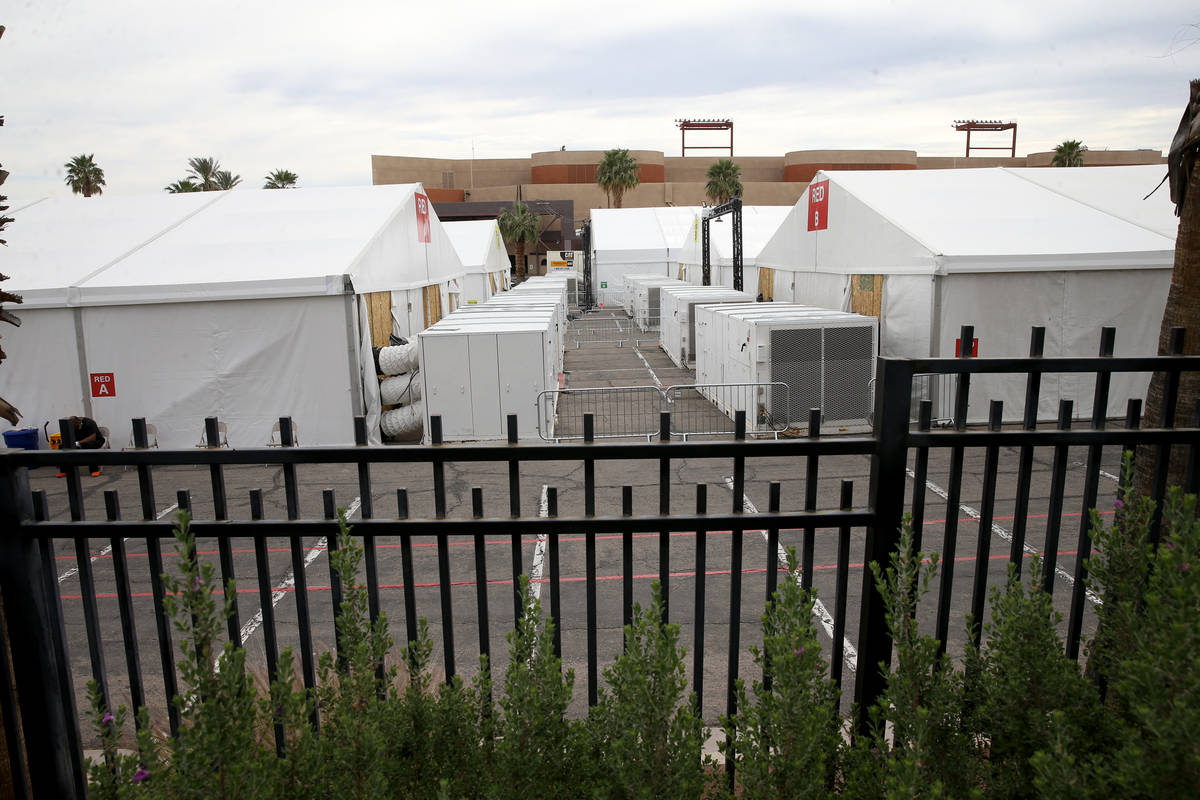Clark County closing homeless treatment center
The ISO-Q (isolation/quarantine) Complex for the homeless at Cashman Center will close at the end of June, and county officials will now invest millions more into social services due to the effects of COVID-19.
The ISO-Q, which was erected in 2½ weeks by Clark County and the city of Las Vegas, stopped taking new patients Monday and will discharge its last patient June 30.
The entire site will be vacated by July 31, Clark County officials said during a Commission meeting Tuesday.
The $8.4 million medical facility was built to serve as many as 500, but has only seen 233 since it opened April 13. On Thursday morning, there were 15 patients in the facility. Seven were quarantined, three were in the isolation symptomatic unit and five of them tested positive for the virus, city officials said.
In addition to medical care, social workers at the county were able to provide housing for about 80 percent of the patients at the Complex, said Tim Burch, the county’s administrator of human resources.
“That’s a phenomenal discharge rate,” he said. “We’ve been able to successfully put most people coming out of the ISO-Q promptly into some sort of filtering, allowing us to move them up that stair step. So we can’t lose focus on that.”
Shift in funding
Burch on Tuesday presented a report and update to the Clark County’s plan to end homelessness, and said that staff at the ISO-Q have also administered 846 COVID-19 tests and helped 20 positive patients recover.
Patients were referred to the facility by area shelters and hospitals, which helped free hospital bed space for more serious cases of the disease. The Complex included Wi-Fi, air conditioning, and separate restroom and shower facilities.
But now, Burch said, the Complex is closing and the county wants to look ahead on how best to spend federal funds and keep moving forward come next year.
Burch estimated that the total cost of the ISO-Q, and additional beds for quarantine that will be provided through the end of the year, would cost around $13 million. He also proposed a $30 million investment in financial assistance services for rent and utility assistance, as well as food and emergency expenses, of which there have been no commitments to date.
He also proposed $33 million for emergency housing and shelter, $45 million for basic need assistance and $21.3 million dedicated to coordinated coronavirus testing sites for the homeless.
The investments through December will serve as a “head start” for 2021 and be covered by existing programs and new programs. The funds may only be used for costs directly tied to economic impacts of the coronavirus, spokesman Dan Kulin said.
Funds for other services
During the Tuesday meeting, Assistant County Manager Kevin Schiller emphasized the importance of mobile COVID-19 outreach units and increased programs to help find housing for medically fragile homeless people who are being discharged from the hospital.
Due to COVID-19, Schiller told commissioners, the county has to consider two levels of populations when looking at social services.
“That’s the homelessness client that we traditionally would come before you and talk about, but it’s also people on the verge of homelessness, it’s people that’s life have been turned upside down,” he said.
Last year’s homeless census counted 5,530 people living on the streets of Clark County, and many people are unsure of what that number will look like once the eviction moratorium lifts, Schiller said.
Schiller said using the federal CARES Act dollars to increase public private partnerships, housing opportunities and addressing needs of the near-homeless will create sustainability in the community.
“It’s an investment in the future, so when we look post December, what we want to be able to do is show that we’ve invested in terms of increasing our capacity and service level,” Schiller said.
A previous version of this article contained an incorrect total number of homeless who have accessed the ISO-Q complex, which was provided by the county.
Contact Briana Erickson at berickson@reviewjournal.com or 702-387-5244. Follow @ByBrianaE on Twitter.






































